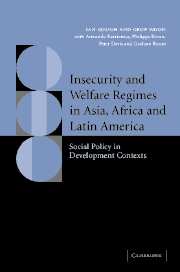 Insecurity and Welfare Regimes in Asia, Africa and Latin America
Insecurity and Welfare Regimes in Asia, Africa and Latin America Book contents
- Frontmatter
- Contents
- List of maps
- List of figures
- List of tables
- List of authors
- Acknowledgements
- List of abbreviations
- Glossary
- Introduction
- Part I Understanding insecurity and welfare regimes in the South: an analytical framework
- Part II Regional regimes
- Part III Regimes in global context
- Conclusion : Rethinking social policy in development contexts
- References
- Index
Conclusion : Rethinking social policy in development contexts
Published online by Cambridge University Press: 04 August 2010
- Frontmatter
- Contents
- List of maps
- List of figures
- List of tables
- List of authors
- Acknowledgements
- List of abbreviations
- Glossary
- Introduction
- Part I Understanding insecurity and welfare regimes in the South: an analytical framework
- Part II Regional regimes
- Part III Regimes in global context
- Conclusion : Rethinking social policy in development contexts
- References
- Index
Summary
This conclusion is in four parts. The first part clarifies the intellectual and normative foundations of the welfare regime approach developed in this book. The second part summarises and situates our findings about welfare regimes in Asia, Africa and Latin America. In the third part we outline in some detail the implications of our approach for thinking about social policy in development contexts. Finally, we consider recent arguments about the globalisation of welfare provision and the scope for a global welfare regime.
Foundations of our approach
This volume begins from a widely held concern to improve global human welfare and progressively reduce poverty. Based on an empirical core, it also has an unashamedly conceptual and theoretical purpose. It seeks to convince readers of the need for a wide range of institutions to contribute to secure welfare under contemporary global conditions. Notwithstanding the unifying and converging forces of global capitalism, we emphasise the variegated and path-dependent patterns of development or lack of development across different zones of the world. This builds on our middle-range theory of welfare regimes, which opposes both teleological or functionalist approaches (both modernisation and Marxist) on the one hand, and post-modern approaches emphasising uniqueness and diversity on the other hand. The political upshot is a distinction between universal goals and context-specific means. It leads us to reject ‘one-size-fits-all’ policy solutions to poverty eradication, whether from the right (unregulated market capitalism), the left (basic income) or the fashionable reformist centre (participation and ‘good governance’).
- Type
- Chapter
- Information
- Insecurity and Welfare Regimes in Asia, Africa and Latin AmericaSocial Policy in Development Contexts, pp. 312 - 326Publisher: Cambridge University PressPrint publication year: 2004
- 3
- Cited by


